Ijraset Journal For Research in Applied Science and Engineering Technology
- Home / Ijraset
- On This Page
- Abstract
- Introduction
- Conclusion
- References
- Copyright
Enhanced Health Management: Tailored Solutions for Elderly Care
Authors: Nidhin Biju, Safal Sakeer Hussain M. S, Shilpa Balaji, Sukanyathara J
DOI Link: https://doi.org/10.22214/ijraset.2024.61146
Certificate: View Certificate
Abstract
In an era characterized by a globally aging pop- ulation, the imperative to address the comprehensive health needs of older adults has intensified. Among these needs, dietary wellness emerges as a fundamental aspect crucial for sustaining vitality and managing age-related conditions. Recognizing this imperative, our work introduces a pioneering personalized health ecosystem tailored to the unique dietary requirements of seniors. Through the utilization of advanced data science and machine learning methodologies, our platform presents a holistic solution aimed at enhancing dietary habits and overall well-being among seniors. Therefore, our health management system endeavors to foster healthy eating practices and augment the quality of life for older adults, thereby cultivating a proactive ethos of wellness and self-care.
Introduction
I. INTRODUCTION
The global demographic landscape is undergoing a significant transformation with an increasing proportion of the population transitioning into older age brackets. With this demographic shift comes a heightened awareness of the unique health needs and challenges faced by elderly citizens. Among these needs, dietary wellness emerges as a critical aspect for maintaining vitality and managing age-related conditions. Recognizing the importance of addressing these challenges, our project endeavors to develop an all-in-one health ecosystem specifically tailored to the needs of elderly individuals. This paper presents a comprehensive overview of our in- novative health management system, which comprises both a website and a mobile application designed to cater to the di- verse health requirements of elderly citizens. [1] Central to our system is the provision of personalized diet recommendations, which are generated using a sophisticated algorithm trained on a dataset collected from Google Forms. By considering factors such as age, gender, height, weight, nutritional preferences, medical history, and activity level, our system delivers tailored breakfast, lunch, and dinner recommendations aimed at promoting optimal health outcomes.
- In addition to personalized diet recommendations, our system offers users the capability to conduct meal nutrition analysis, empowering them to make informed dietary choices by visualizing the nutritional content of their meals. Further- more, our system features an interactive chatbot designed to address health-related queries, providing users with instant access to relevant information and guidance. [7] Beyond dietary management, our system enhances user engagement and knowledge acquisition through curated content streams, including the latest news from reputable sources such as the BBC website and trending healthcare videos sourced from YouTube. [10] Moreover, recognizing the importance of cognitive health, our system incorporates cognitive mind games such as Sudoku and Pokemon mind games, aimed at improving the cognitive abilities of elderly individuals.
[2] In summary, our all-in-one health ecosystem represents a holistic approach to elderly health management, leveraging cutting-edge technology to provide personalized dietary guidance, facilitate nutrition analysis, deliver relevant health information, and promote cognitive well-being. Through the integration of these features, our system aims to empower elderly citizens to take proactive steps towards maintaining and enhancing their overall health and quality of life.
II. RELATED WORKS
A. Overview of Elderly Health Management Systems
Elderly health management systems represent a burgeoning field of research and development aimed at addressing the unique health needs of older adults. These systems encompass a range of features and functionalities tailored to promote health and well-being among elderly populations. Personalized diet recommendation systems have emerged as a key component of many such systems, leveraging advanced algorithms and user data to deliver tailored dietary guidance based on individualized factors such as age, gender, medical history, and dietary preferences. [6] Nutrition analysis tools play a crucial role in supporting dietary management efforts, enabling users to track their dietary intake and monitor nutritional content to make informed choices.
Additionally, health chat bots and information retrieval systems provide instant access to relevant health information and resources, empowering users to seek guidance and support as needed. While existing systems offer promising capabilities for improving health outcomes and quality of life for older adults, ongoing research and innovation are needed to enhance the effectiveness and usability of these systems in promoting healthy aging and well-being.
B. Personalized Diet Recommendation Systems
In the realm of personalized diet recommendation systems, research has been focused on leveraging advanced algorithms and user data to deliver tailored dietary guidance for older adults. These systems consider individualized factors such as age, gender, medical history, dietary preferences, and activity level to generate customized meal plans aimed at promoting optimal nutrition and overall well-being. By utilizing machine learning techniques and sophisticated data analysis, researchers aim to refine the accuracy and effectiveness of these systems in addressing the specific dietary needs and health goals of elderly populations.
???????C. Nutrition Analysis Tools
In the domain of nutrition analysis tools, research efforts have concentrated on developing user-friendly platforms that empower older adults to monitor their dietary intake and make informed choices regarding nutrition. These tools provide functionalities for tracking meals and snacks consumed throughout the day, along with comprehensive nutritional analysis features that offer insights into the macro and micro nutrient composition of users’ diets. By visualizing nutritional data in an accessible format, these tools facilitate greater awareness of dietary habits and enable users to identify areas for improvement in their eating patterns. Moreover, ongoing advancements in data visualization techniques and integration with wearable devices hold promise for enhancing the usability and effectiveness of nutrition analysis tools in promoting healthy eating behaviors among elderly populations.
???????D. Health Chatbots and Information Retrieval Systems
Within the realm of health chatbots and information retrieval systems, research has been dedicated to developing intelligent conversational agents that cater to the specific health-related inquiries and needs of elderly individuals. These chatbots utilize natural language processing algorithms to understand user queries and provide accurate and timely responses, offering a convenient and accessible means for accessing health information and resources. Moreover, studies have explored the integration of chatbots with existing health management systems to enhance user engagement and support self-care initiatives among older adults. As technology continues to evolve, there is ongoing exploration into further optimizing the functionality and usability of health chatbots to meet the evolving needs of elderly populations and promote active aging.
E. Web Scraping for Content Aggregation
[7] In the domain of web scraping for content aggregation, researchers have explored techniques for gathering and curating health-related information from various online sources to provide users with a comprehensive and up-to-date repository of resources. Studies have investigated the use of web scraping algorithms to extract relevant content from websites, including news articles, blog posts, and multimedia content, and present it in a user-friendly format within health management systems for elderly populations. By aggregating content from reputable sources, such as news websites and video-sharing platforms, these systems aim to enhance user engagement and promote health literacy among older adults. Additionally, efforts have been made to address challenges related to data quality, legality, and ethical considerations associated with web scraping practices, ensuring that users have access to accurate and trustworthy information to support their health and well-being.
???????F. Cognitive Health Interventions
In the domain of cognitive health interventions, research has focused on developing engaging and effective activities aimed at improving cognitive abilities among elderly individuals. Studies have explored the integration of cognitive training games and exercises into health management systems to promote mental acuity and overall well-being in older adults. [10] Activities such as Sudoku and Pokemon mind games have been investigated for their potential to enhance memory, attention, and problem-solving skills, thereby supporting cognitive function in aging populations. By incorporating these interventions into comprehensive health ecosystems, researchers aim to empower older adults to maintain cognitive vitality and promote healthy aging. Ongoing research endeavors seek to further optimize the design and delivery of cognitive health interventions to maximize their impact and accessibility for elderly populations.
???????G. Ensemble Learning
In the realm of ensemble learning, researchers have explored the application of advanced machine learning techniques, such as the CatBoost classifier, to develop robust and accurate models for personalized health management systems targeting elderly populations. [8] Ensemble learning methods combine multiple base models to improve predictive performance and generalization capabilities, making them well-suited for handling complex datasets and heterogeneous features characteristic of health-related data. Studies have investigated the effectiveness of ensemble learning approaches, including boosting algorithms like CatBoost, in generating personalized diet recommendations and health predictions based on individualized factors such as age, gender, medical history, and lifestyle choices. By harnessing the power of ensemble learning, researchers aim to enhance the accuracy and reliability of predictive models within health management
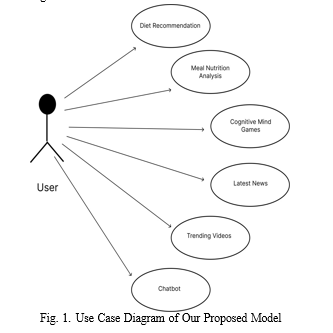
systems, thereby facilitating more effective decision-making and personalized interventions to support the health and well-being of older adults. [4] Ongoing research efforts continue to explore novel ensemble learning methodologies and their integration into comprehensive health ecosystems to further advance the field of personalized elderly care.
???????III. PROPOSED MODEL
The project endeavors to introduce an all-encompassing health ecosystem tailored specifically for elderly citizens, comprising both a website and a mobile application. This innovative model integrates a diverse array of features aimed at addressing the multifaceted health management needs of older adults. Central to the proposed model is a sophisticated diet recommendation system, which leverages data collected from Google Forms and employs the CatBoost algorithm to provide personalized breakfast, lunch, and dinner recommendations based on individual attributes such as age, gender, height, weight, nutritional preferences, medical history, and activity level. Furthermore, the model incorporates a meal nutrition analysis feature, allowing users to input their daily meals and visualize nutritional values to make informed dietary choices. In addition to dietary management, the model integrates a health chatbot capable of addressing user queries, providing instant access to relevant health information. Web scraping functionalities are utilized to display the latest news from reputable sources such as the BBC website and trending healthcare videos from YouTube, ensuring users stay informed and engaged. Moreover, the model includes cognitive mind games such as Sudoku and Pokemon mind games, designed to enhance the cognitive abilities of elderly users. Through this comprehensive and user-centric approach, the proposed model seeks to revolutionize elderly healthcare by empowering older adults to proactively manage their health and well-being in an accessible and intuitive manner.
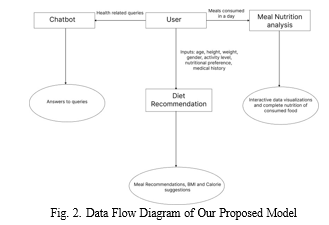
??????????????IV. DIETARY MANAGEMENT
This section delves into the core aspect of the health ecosystem: dietary management tailored specifically for elderly individuals. Given the paramount importance of nutrition in promoting well-being among older adults, the following subsections detail the intricacies of the diet recommendation system and meal nutrition analysis feature, elucidating how these components work harmoniously to empower users to make informed dietary choices and cultivate healthy eating habits.
???????A. Data Collection
To ensure the personalized nature of our dietary recommendation system, data collection directly from the target audience was paramount. We employed a Google Form specifically designed to gather essential demographic and health-related information from elderly individuals. This form was meticulously crafted in collaboration with a certified dietitian to ensure the inclusion of relevant factors crucial for generating tailored dietary recommendations. By consulting with a dietitian, we ensured that the data collected encompassed a comprehensive range of attributes, including age, gender, height, weight, nutritional preferences, medical history, and activity level. This collaborative approach facilitated the acquisition of high-quality data directly from the target demographic, thereby enhancing the accuracy and relevance of the dietary recommendations provided by our health ecosystem.
???????B. Data Preprocessing
In preparing the collected data for analysis and model training, several preprocessing steps were undertaken to ensure the integrity and relevance of the dataset. One crucial aspect of preprocessing involved handling inconsistent data entries, particularly those from individuals outside the target demographic of elderly citizens aged 50 years and above. While the Google Form was open to a broader age range, it was imperative to filter out irrelevant responses to maintain the focus on our project’s target audience. Additionally, missing data points were addressed through appropriate imputation techniques to mitigate any potential biases introduced by incomplete records. By meticulously preprocessing the dataset, we aimed to optimize the quality and utility of the data for subsequent analysis and model development within our dietary management system.
???????C. Recommendations and results
Utilizing the comprehensive user attributes collected through the Google Form, alongside individual Body Mass Index (BMI) calculations, our dietary recommendation system generates personalized meal plans tailored to each user’s specific nutritional needs and health goals. By incorporating factors such as age, gender, height, weight, nutritional preferences, medical history, and activity level, our system calculates the daily calorie requirements for each user, ensuring a precise and individualized approach to dietary management. Subsequently, breakfast, lunch, and dinner recommendations are dynamically generated based on these calculated calorie targets, providing users with practical and health-conscious meal options to support their overall well-being. In this subsection, we elucidate the intricacies of our recommendation algorithm and present the empirical results obtained from user interactions with the system, demonstrating its efficacy in delivering personalized dietary guidance to elderly individuals.
???????D. Meal Nutrition Analysis
In this subsection, we delve into the functionality of our meal nutrition analysis feature, designed to empower users to make informed dietary choices by providing insights into the nutritional content of their meals. Users are prompted to input the breakfast, lunch, and dinner consumed throughout the day, detailing the specific food items and portion sizes. Leveraging this input, our system dynamically generates data visualizations in the form of doughnut charts and bar charts, depicting key nutritional values such as macro nutrient composition (carbohydrates, proteins, fats), micro nutrient content (vitamins, minerals), and calorie distribution. Through intuitive visual representations, users gain a clear understanding of the nutritional profile of their meals, facilitating greater awareness and enabling them to align their dietary choices with their health and wellness goals.
V. WEB SCRAPING
The web scraping functionalities integrated into our health ecosystem, aims at providing users with access to timely and
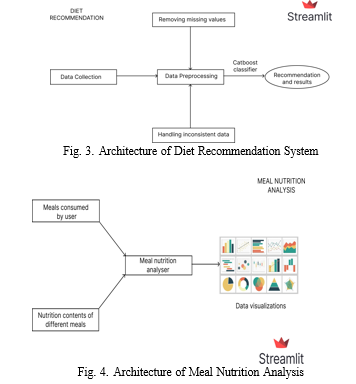
relevant information from trusted sources. Leveraging the Python feedparser library, our system aggregates the latest news articles from the BBC News website, ensuring users stay informed about current events and developments in the field of elderly health. Additionally, our web scraping module extracts trending YouTube videos related to elderly health, offering users access to informative and engaging content curated from a diverse range of sources. By harnessing the power of web scraping technology, our health ecosystem enriches the user experience by delivering valuable and up- to-date information directly to users’ fingertips, empowering them to stay abreast of the latest trends and insights in elderly health care.
???????VI. CHAT BOT
In this subsection, we delve into the functionality of our chat bot feature, designed to provide users with instant access to health-related information and guidance. Leveraging state-of-the-art technology, our chat bot was developed using Chatbase, a powerful platform for building conversational interfaces. Through extensive training on a dataset comprising approximately 23,000 health-related queries and responses, our chat bot has been equipped with a vast knowledge base spanning a wide range of health topics relevant to elderly individuals. Users can interact with the chat bot in
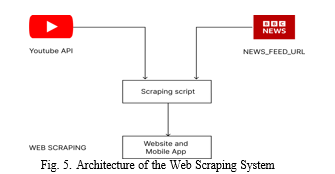
natural language, posing questions and seeking advice on various health concerns, medications, treatments, and lifestyle recommendations. With its advanced natural language processing capabilities, the chat bot interprets user queries with precision and accuracy, delivering informative and personalized responses in real-time. By providing an intuitive and accessible interface for accessing health information, our chat bot empowers users to make informed decisions about their health and well-being, fostering a proactive approach to self-care among elderly individuals.
???????VII. COGNITIVE MIND GAMES
This section introduces the inclusion of cognitive mind games within our health ecosystem, aimed at promoting cognitive health and mental acuity among elderly users. These games serve as engaging and enjoyable activities designed to stimulate various cognitive functions, including memory, attention, problem-solving, and reasoning skills. In our health ecosystem, we have integrated two popular cognitive mind games: Sudoku and a Pokemon mind game. Sudoku is a classic puzzle game that challenges players to fill a grid with numbers while adhering to specific rules, thereby exercising logical reasoning and pattern recognition abilities. The Pokemon mind game offers a unique twist by combining elements of memory and strategy, encouraging players to match cards while navigating through increasingly complex levels. By incorporating these cognitive mind games into our health ecosystem, we aim to provide users with enjoyable and beneficial activities that not only entertain but also contribute to the maintenance and enhancement of cognitive function in elderly individuals.
VIII. RESULTS
The outcomes of our study unveil the practical implications and effectiveness of our all-in-one health ecosystem tailored for elderly citizens. We commence by outlining user engagement metrics, shedding light on the platform’s adoption rates and reach within the target demographic. Following this,
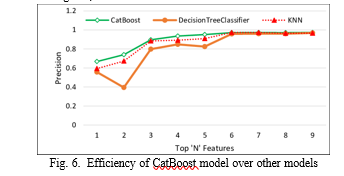
we delve into a detailed examination of each component’s performance, spanning from the diet recommendation system to the cognitive mind games. Through a combination of quantitative data analysis and qualitative feedback analysis, we uncover valuable insights into the system’s impact on users’ health management practices and overall well-being. By presenting the results in a clear and comprehensive manner, we aim to provide a holistic understanding of the efficacy and benefits derived from our innovative health ecosystem for elderly individuals.
???????IX. FUTURE SCOPE
- Integration with Home Monitoring Systems: Extend the project to seamlessly integrate with home monitoring systems, enabling elderly users to access our software directly on monitor screens within their homes. Enhance accessibility and promote continuous engagement with our platform by integrating it into the daily lives of elderly individuals.
- Appointment Booking and Medication Management: In- corporate a feature allowing users to book medical appointments and manage medication refills from the com- fort of their homes through our software. Streamline the healthcare journey for elderly individuals by providing convenient access to essential healthcare services and medications, reducing barriers to care
- Expansion of Content Offerings: Expand the content offerings within our platform to include educational re- sources, lifestyle tips, and interactive modules tailored to the specific needs and interests of elderly users. Foster lifelong learning and promote holistic well-being by pro- viding diverse and engaging content aimed at enhancing physical, mental, and emotional health.
- Integration of Wearable Health Devices: Explore opportunities to integrate wearable health devices, such as fitness trackers and smart watches, into our health ecosystem to enhance data collection and personalized health monitor- ing capabilities. Leverage real-time health data captured by wearable devices to provide personalized insights and recommendations, empowering users to take proactive steps towards better health.
- Implementation of Telemedicine Services: Partner with healthcare providers to implement telemedicine services within our platform, enabling elderly users to consult with healthcare professionals remotely. Facilitate timely access to medical advice and support, particularly for individuals with mobility limitations or living in remote areas, thereby improving health outcomes and quality of life.
- Fall Detection System: Integrate a fall detection sys- tem within our health ecosystem to monitor and alert caregivers or emergency services in the event of a fall. Utilize sensor-based technology or wearable devices to detect falls and trigger automated alerts, providing timely assistance to elderly users and enhancing their safety and well-being.
In summary, the outlined future scope presents a roadmap for further elevating our health ecosystem’s impact and reach. By integrating with home monitoring systems, enhancing appointment booking functionalities, and expanding content offerings, we aim to continue empowering elderly individuals in their healthcare journey. These advancements promise to strengthen accessibility, convenience, and overall effectiveness, fostering a proactive culture of well-being among elderly populations.
Conclusion
In this paper, we have presented an innovative all-in-one health ecosystem tailored specifically for elderly citizens. Through the integration of personalized dietary management, cognitive mind games, web scraping functionalities, and a chatbot feature, our platform aims to address the diverse health management needs of older adults in the digital age. The results of our study demonstrate the efficacy and promise of our health ecosystem in promoting healthy aging, enhancing quality of life, and empowering elderly individuals to take proactive control of their health and well-being. Looking ahead, continued refinement and expansion of our platform will further solidify its role as a valuable resource in elderly healthcare, contributing to the advancement of holistic and personalized approaches to elderly wellness.
References
[1] Md. Shamsujjoha, John Grundy, Hourieh Khalajzadeh, Qinghua Lu, Li Li, Developer and End-User Perspectives on Addressing Human Aspects in Mobile eHealth Apps, Information and Software Technology, Volume 166, 2024, [2] Johan Frishammar, Anna Esse´n, Frida Bergstro¨m, Tilda Ekman, Digital health platforms for the elderly? Key adoption and usage barriers and ways to address them, Technological Forecasting and Social Change, Volume 189, 2023, [3] Vijayaragavan Pichiyan, S Muthulingam, Sathar G, Sunanda Nalajala, Akhil Ch, Manmath Nath Das, Web Scraping using Natural Language Processing: Exploiting Unstructured Text for Data Extraction and Anal- ysis, Procedia Computer Science, Volume 230, 2023, [4] Leren Qian, Zhongsheng Chen, Yiqian Huang, Russell J. Stanford, Em- ploying categorical boosting (CatBoost) and meta-heuristic algorithms for predicting the urban gas consumption, Urban Climate, Volume 51, 2023, [5] Sumit Kumar, Uponika Barman Roy, 2 - A technique of data collection: web scraping with python, Editor(s): Tilottama Goswami, G.R. Sinha, Statistical Modeling in Machine Learning, Academic Press, 2023, [6] Sabiha Samad, Fahmida Ahmed, Samsun Naher, Muhammad Ashad Kabir, Anik Das, Sumaiya Amin, Sheikh Mohammed Shariful Islam, Smartphone apps for tracking food consumption and recommendations: Evaluating artificial intelligence-based functionalities, features and qual- ity of current apps, Intelligent Systems with Applications, Volume 15, 2022, [7] Parneet Kaur, Sentiment analysis using web scraping for live news data with machine learning algorithms, Materials Today: Proceedings, Volume 65, Part 8, 2022, [8] Saddam Hussain, Mohd. Wazir Mustafa, Touqeer A. Jumani, Shadi Khan Baloch, Hammad Alotaibi, Ilyas Khan, Afrasyab Khan, A novel feature engineered-CatBoost-based supervised machine learning framework for electricity theft detection, Energy Reports, Volume 7, 2021, [9] Ibrahim Elmadfa, Alexa L. Meyer, Chapter 5 - Nutrition, aging, and requirements in the elderly, Editor(s): Bernadette P. Marriott, Diane F. Birt, Virginia A. Stallings, Allison A. Yates, Present Knowledge in Nutrition (Eleventh Edition), Academic Press, 2020, [10] Amir Talaei-Khoei, Jay Daniel, How younger elderly realize usefulness of cognitive training video games to maintain their independent living, International Journal of Information Management, Volume 42, 2018,
Copyright
Copyright © 2024 Nidhin Biju, Safal Sakeer Hussain M. S, Shilpa Balaji, Sukanyathara J. This is an open access article distributed under the Creative Commons Attribution License, which permits unrestricted use, distribution, and reproduction in any medium, provided the original work is properly cited.

Download Paper
Paper Id : IJRASET61146
Publish Date : 2024-04-27
ISSN : 2321-9653
Publisher Name : IJRASET
DOI Link : Click Here
 Submit Paper Online
Submit Paper Online

